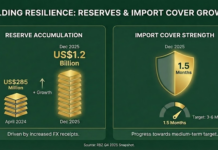
By Staff Reporter
Harare – Zimbabwe’s government has called for stronger environmental, social, and governance (ESG) compliance across the public and private sectors as the country’s economy posts a significant rebound, with GDP revised to US\$44.5 billion.
Speaking at the inaugural ESG Reporting Workshop held in Harare on Tuesday, Deputy Minister of Finance, Economic Development and Investment Promotion, Honourable Kudakwashe David Mnangagwa, said ESG reporting must be central to Zimbabwe’s development strategy.
“This workshop marks the first in a series of engagements aimed at embedding a culture of accountability and transparency. ESG reporting is not simply about disclosure – it is about shaping an accountable, green, and equitable future,” said Mnangagwa.
Held under the theme *“Advancing ESG Reporting in Zimbabwe: Challenges, Opportunities, and the Road Ahead,”* the workshop brought together regulators, policymakers, corporates, and civil society to explore ways of integrating ESG standards into national planning and reporting frameworks.
Mnangagwa applauded President Emmerson Mnangagwa’s leadership under Vision 2030, saying the country has witnessed “transformational progress” in governance, economic, and social sectors since the rollout of the National Development Strategy 1 (NDS1).
He announced that Zimbabwe’s GDP had been revised upward from US\$35.2 billion in 2023 to US\$44.5 billion, following the recently concluded Economic Census conducted by ZIMSTAT. The revision reflects improved data coverage of both formal and informal economic activities.
The Deputy Minister said the structure of Zimbabwe’s economy is shifting, with the manufacturing sector now contributing 15.3% to GDP, followed by mining at 14.5%, and financial services at 10.8%. He noted this transition from a historically retail-driven economy signals greater industrialisation and financial deepening.
However, he warned that growth must be matched by adherence to ESG principles.
“There is need to ascertain whether all economic players are adhering to ESG best practices. Growth must go hand-in-hand with environmental responsibility, social inclusion, and governance excellence,” Mnangagwa said.
On the regulatory front, he said the Securities and Exchange Commission of Zimbabwe (SECZIM) is spearheading efforts to enforce ESG standards among listed entities. Companies on the Zimbabwe Stock Exchange (ZSE) and the Victoria Falls Stock Exchange (VFEX) are now required to submit ESG and sustainability reports for financial years beginning on or after January 1, 2024.
The ESG reporting framework is anchored by several oversight bodies, including the Public Accountants and Auditors Board (PAAB), SECZIM, and the Corporate Governance Unit in the Office of the President and Cabinet, which oversees public sector reporting through the Integrated Results-Based Management (IRBM) system.
Mnangagwa urged stakeholders to go beyond regulatory compliance and contribute to building a more transparent, accountable, and climate-resilient Zimbabwe.
“Let us work collaboratively to build ESG resilience, which is essential to achieving NDS1, the forthcoming NDS2, and ultimately Vision 2030,” he said.
The workshop is expected to inform the implementation of Zimbabwe’s ESG Reporting Roadmap and accelerate national efforts to align development with sustainability principles.










